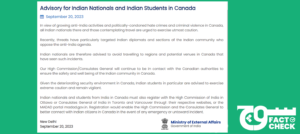
Claim: After the murder of Hardeep Singh Nijjar in Canada, the Canadian government has issued a travel advisory against travelling to India, citing terrorism concerns.
Fact: India has issued a travel advisory against travelling to Canada, citing concerns of terrorism, not the other way around.
On 21 September 2023, social media user Asif Jatt shared a video titled “بھارت کی عزت مٹی میں مل گئی” [Translation: India’s reputation has turned to dust] with a caption. The video claims that Canada has expelled the Indian ambassador from the country, and now Canadian citizens are not allowed to travel to India. In the video, the social media user explains that Canada has issued an official travel advisory advising citizens not to travel to India, citing concerns regarding terrorism. The video also compares the severity of this advisory to the statement on Pakistani passports, which disallow any and all travel to Israel. This is an exemption built into the Pakistani passport, which rejects any kind of travel to Israel. Citizens who have attempted to travel on Pakistani passports to Israel have been arrested by the authorities in the past. Pakistan does not formally recognise Israel or maintain any diplomatic relations with Israel.
Hardeep Singh Nijjar is an Indian Sikh and a Canadian citizen. He was active as a Sikh separatist leader in India and Prime Minister Justin Trudeau has publicly announced that Ottawa has credible intelligence linking Indian agents to his murder. According to news reports, he was shot dead outside a Sikh temple in Surrey, British Columbia, in June. India has, however, denied these allegations and labelled them “absurd”. The United States has also come out to urge the Indian government to cooperate with Canada in their investigation of the murder.
Hardeep Singh Nijjar was born in Jalandhar, Punjab, India, and moved to Canada in 1997. He was a vocal advocate of the Khalistan movement, which demands a separate homeland for the Sikh community, who make up 2% of India’s population.
Fact or Fiction?
Soch Fact Check investigated the matter further. We found that India issued a travel advisory cautioning its citizens, especially students, from travelling to Canada. On 20 September 2023 the Ministry of External Affairs in India issued an advisory for Indian nationals and Indian students in Canada.

Voice of America (VoA) reported the Indian foreign ministry wrote, “Threats have particularly targeted Indian diplomats and sections of the Indian community who oppose the anti-India agenda… Given the deteriorating security environment in Canada, Indian students in particular are advised to exercise extreme caution and remain vigilant.”
Canada issued a rejection of this advisory the same day and Canadian Public Safety Minister Dominic LeBlanc said, “Canada is a safe country.” In turn, Canada then issued its own travel advisory mandating citizens to exercise a high degree of caution due to the threat of terrorist attacks throughout the country. The advisory asked citizens to avoid all non-essential travel to Assam and Manipur and to avoid all travel whatsoever to the Union Territory of Jammu and Kashmir and the areas within 10km of the border with Pakistan (Gujarat, Punjab and Rajasthan).
This makes it evident that India issued a travel advisory against Canada, citing terrorism concerns, and in response to that, Canada did the same. But neither of these advisories mean that citizens from either country are forbidden to travel to the other country; citizens are simply asked to exercise caution while travelling due to cited security concerns. It can not be compared to the exemption built into the Pakistani passport, which rejects any kind of travel to Israel.
Virality
The video on Facebook has 633,000 views and more than 67,900 interactions.
We also found the same video shared on Facebook here, here, here, and here.
Conclusion: Canada did not expel the Indian ambassador but both countries have issued travel advisories against travelling to the other country.
To appeal our fact-check, please send an email to appeals@sochfactcheck.com
